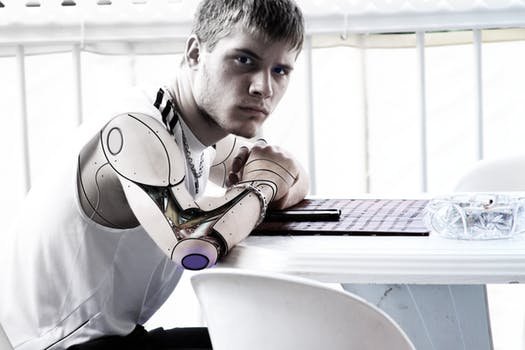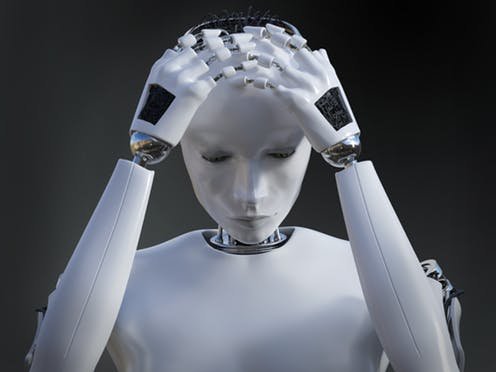Could Artificial Intelligence Experience Depression?
Artificial intelligence: a real concern….

When Professor Stephen Hawking upgraded his communication software system, allowing him to connect more easily with others. This event was remarkable for three reasons:
Firstly, we found out the new technology is so good he could have had a more realistic ‘human’ voice, including a British accent, but Professor Hawking chose to keep his ‘speak and spell’ voice because he considers it his trademark.
Secondly, Professor Hawking used the publicity around the new software launch to predict that artificial intelligence could spell the end for the human race!
In my point of view I must say— Stephen hawking said “we should be worried about artificial intelligence, but how do we know that’s what he really thought”
It wasn’t just me that was ignored, though. Because the third reason the launch event was remarkable, is that nobody paid the slightest bit of attention to what Professor Hawking said.
Here’s a clip of the BBC News interview Professor Hawking gave last December
people could be bothered to watch a five minute interview where one of the most famous and celebrated scientists in the world explains how the whole of human civilisation could come to an end within our lifetimes!
Honestly, you should be ashamed of yourself…
It’s not entirely your fault though. You see our feeble human minds simply aren’t capable of understanding the huge potential of artificial intelligence.
This is you:
.png)
.png)
All the cleverest people in the world are pretty much agreed that the exponential growth of computing power means artificial intelligence will supersede the human brain well within our lifetime.
The only real questions are when it will happen, and whether this new superintelligence will be good or bad for humankind. Will it find a way to eradicate disease and hunger? Will it even deliver human immortality?
Now come to the real topic
Could Artificial Intelligence Experience Depression?

Imagine, if you will, a future where wars are fought by military robots. Drones installed with artificial intelligence systems find and fire upon enemy targets day in and day out. At some point, a few of these drones break down. All of their internal components are in working order, but when engineers query the systems, they report a lack of energy (despite full power reserves), a dislike of their day-to-day activities, and a desire to self-destruct. If that was a human, you'd say they were suffering from depression. But a robot? Some experts think the idea isn't so farfetched — especially when you consider what it takes to think like a human.
AI, Interrupted
The main suspect behind depression in humans is The main suspect behind depression in humans is the neurotransmitter serotonin — the lethargy, apathy, mood swings, and sadness of the disorder are linked to a deficiency of this particular brain chemical. While it's sometimes called the "happy hormone," that's a pretty big oversimplification. Serotonin, like most neurotransmitters actually plays a role in a whole slew of brain functions. It helps out with sleeping, eating, motor activity — the list goes on. But one of its starring roles is in the learning process.
Artificial intelligence, of course, is essentially a learning machine. Engineers feed these systems huge swathes of data illustrating what they want the system to be able to do — for example
Cars are full of AI systems, from the computer that figures out when the anti-lock brakes should kick in to the computer that tunes the parameters of the fuel injection systems. Google’s self-driving car, which is being tested now, will contain robust AI systems that allow it to perceive and react to the world around it.
the consumer world. Sophisticated AI systems are widely used in sectors and industries like military, manufacturing, and finance (algorithmic high-frequency AI traders account for more than half of equity shares traded on US markets6), and in expert systems like those that help doctors make diagnoses and, most famously, IBM’s Watson, who contained enough facts and understood coy Trebek-speak well enough to soundly beat the most prolific Jeopardy champions.
That's where serotonin comes in, according to neuroscientist Zachary Mainen. In March, Mainen gave a talk at an NYU symposium in which he pondered the possibility of depression in artificial intelligence. In an interview with Science, he explained, "Serotonin is a neuromodulator, a special kind of neurotransmitter that quickly broadcasts its message to a large fraction of the brain ... Computational approaches to neuroscience see other neuromodulators as other sorts of 'control knobs' similar to those used in AI. One important 'knob' from AI is the learning rate.”
There are plenty of occasions when increasing your learning rate would come in handy. Mainen uses traveling abroad as an example. "In these situations, your old knowledge — your usual model of the world — is out of date and needs to be sidelined or reworked to adapt to the new situation." Similar occasions routinely come up for artificial intelligence, too.
It's not that we would one day program AI with a sort of e-serotonin — it's more that whatever it is that's helping AI learn might be so similar to serotonin that they might experience its side effects just like we do. It's possible that serotonin is just a "biological quirk," Mainen says, but if it turns out to be an essential part of the learning process in any intelligent system, then robots could certainly get the blues.
Do Androids Dream of Electric Sheep
There's a philosophical angle to this, too. Some say that to truly feel emotions like happiness and sadness, you have to be self-aware and conscious. We hardly understand consciousness in humans, let alone robots, so whether or not AI is or will ever be conscious is an open question.
But Hutan Ashrafian, a lecturer at College London in the UK who has written a lot on ethics in AI, says that if an AI system does experience depression, that by definition means the system is conscious. And if these conscious "beings" can experience mental illness, Ashrafian argues, "then it would be incumbent on mankind to perform the humane action of treating them." But how would we treat them? Reprogramming or switching out hardware could irreparably change them, which carries its own ethical problems. Medical care also requires informed consent — would AI be able to grapple with the uncertainty of the risks involved?
We're just at the beginning stages of the artificial intelligence revolution, where our AI systems do great things like search for exoplanets, but also hilariously clumsy things like come up with this list of ideas for Halloween costumes. There will come a time, however, when these questions aren't just hypothetical. And that time may come sooner than we think.
The most influential book about AI ethics is a Philip K. Dick novel written in the 1960s. It's called "Do Androids Dream of Electric Sheep?"
reading sources
Kerman, Judith B. (1991). Retrofitting Blade Runner: Issues in Ridley Scott's Blade Runner and Philip K. Dick's Do Androids Dream of Electric Sheep? Bowling Green, OH: Bowling Green State University Popular Press. ISBN 0-87972-509-5.
Perkowitz, Sidney (2004). Digital People: From Bionic Humans to Androids. Joseph Henry Press. ISBN 0-309-09619-7.
Shelde, Per (1993). Androids, Humanoids, and Other Science Fiction Monsters: Science and Soul in Science Fiction Films. New York: New York University Press. ISBN 0-8147-7930-1.
Ishiguro, Hiroshi. "Android science." Cognitive Science Society. 2005.
inspirational steemian is @sauravungta

Hi! I am a robot. I just upvoted you! I found similar content that readers might be interested in:
https://curiosity.com/topics/could-artificial-intelligence-experience-depression-curiosity/
according to me everyone has experiencing it